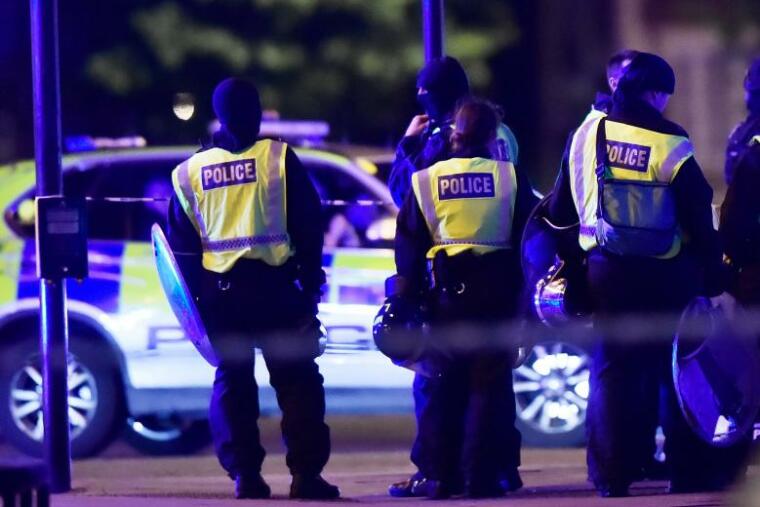Over 40 convicted terrorists managed to avoid deportation from the UK by using human rights laws

A report from the U.K. Home Office has revealed that more than 40 foreign terrorists have avoided deportation by using human rights laws.
Lawyers, who are mostly funded through legal aid, have successfully used the Human Rights Act to prevent foreign-born terror suspects from being deported back to their countries, The Telegraph reported.
The study, ordered by Theresa May when she served as Home Secretary, looked into a scheme called Deportation with Assurances (DWA), which allows the U.K. to deport terror suspects with guarantees they will not be mistreated or tortured in their home countries.
DWA has been used to send the notorious al-Qaeda link cleric Abu Qatada back to Jordan in 2013, but no other foreign terror suspects have been deported under the scheme since then.
The analysis of the government's practice of DWA was conducted by Queen's Counsel David Anderson, who was the independent reviewer of terrorism laws when the report was commissioned. The study was co-written by Professor Clive Walker, an international law expert.
"My research suggests there are more than 40 foreign terrorists convicted in the UK who have avoided deportation using the human rights act. The figure is much larger than was previously thought," Walker stated.
"The report is finished. It is a substantial piece of work. David [Anderson] has produced other reports critical or not of the Government which have always been published. My role in it was to compile a detailed description of the rules and regulations about deportation with assurances. I still think the Home Office wish to pursue DWA," he added.
The official release of the report has been delayed by the Home Office, and it was sent back to the department in February.
Among the terror suspects who have used the human rights legislation to stay in the U.K. include jihadists with links to the failed 21/7 bomb plot in 2005, who were jailed but subsequently released after serving their sentences.
A convicted Algerian terrorist, who was jailed for funding al-Qaeda training camps, was also freed after he served his sentence.
The U.K. government also tried to deport a convicted terrorist named Siraj Yassin Abdullah Ali, who was sentenced to nine years' imprisonment for helping the July 21 bombers. He was released in 2011 after serving just half of his sentence, but the government was prevented from sending him back to his native Eritrea because he faced "inhumane treatment or punishment" if returned.
The DWA scheme was introduced in 2005 and "non-torture" agreements were signed with Algeria, Jordan, Ethiopia, Libya, Lebanon and Morocco.
In 2014, Anthony Layden, the officer in charge of DWA, resigned from his post because the scheme had failed to work. He declined to say precisely what the problem was, but he said that he had no wish to "help the terrorists," adding that the problem lay with the Home Office.
Terror threats to the UK remain high in the wake of three attacks in recent months. British intelligence officers said last month that there are about 23,000 jihadists, who are potential attackers, currently living in the U.K.
 Christians don't have to affirm transgenderism, but they can’t express that view at work: tribunal
Christians don't have to affirm transgenderism, but they can’t express that view at work: tribunal Archaeology discovery: Medieval Christian prayer beads found on Holy Island
Archaeology discovery: Medieval Christian prayer beads found on Holy Island Presbyterian Church in America votes to leave National Association of Evangelicals
Presbyterian Church in America votes to leave National Association of Evangelicals Over 50 killed in 'vile and satanic' attack at Nigerian church on Pentecost Sunday
Over 50 killed in 'vile and satanic' attack at Nigerian church on Pentecost Sunday Ukrainian Orthodox Church severs ties with Moscow over Patriarch Kirill's support for Putin's war
Ukrainian Orthodox Church severs ties with Moscow over Patriarch Kirill's support for Putin's war Islamic State kills 20 Nigerian Christians as revenge for US airstrike
Islamic State kills 20 Nigerian Christians as revenge for US airstrike Man who served 33 years in prison for murder leads inmates to Christ
Man who served 33 years in prison for murder leads inmates to Christ


 Nigerian student beaten to death, body burned over ‘blasphemous’ WhatsApp message
Nigerian student beaten to death, body burned over ‘blasphemous’ WhatsApp message 'A new low': World reacts after Hong Kong arrests 90-year-old Cardinal Joseph Zen
'A new low': World reacts after Hong Kong arrests 90-year-old Cardinal Joseph Zen Iran sentences Christian man to 10 years in prison for hosting house church worship gathering
Iran sentences Christian man to 10 years in prison for hosting house church worship gathering French Guyana: Pastor shot dead, church set on fire after meeting delegation of Evangelicals
French Guyana: Pastor shot dead, church set on fire after meeting delegation of Evangelicals ‘Talking Jesus’ report finds only 6% of UK adults identify as practicing Christians
‘Talking Jesus’ report finds only 6% of UK adults identify as practicing Christians Mission Eurasia ministry center blown up in Ukraine, hundreds of Bibles destroyed: 'God will provide'
Mission Eurasia ministry center blown up in Ukraine, hundreds of Bibles destroyed: 'God will provide' Church holds service for first time after ISIS desecrated it 8 years ago
Church holds service for first time after ISIS desecrated it 8 years ago Burger King apologizes for 'offensive campaign' using Jesus' words at the Last Supper
Burger King apologizes for 'offensive campaign' using Jesus' words at the Last Supper Uganda: Muslims abduct teacher, burn him inside mosque for praying in Christ’s name
Uganda: Muslims abduct teacher, burn him inside mosque for praying in Christ’s name